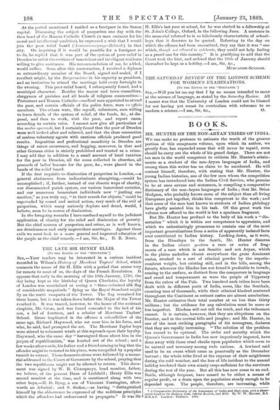THE LATE SIR HENRY ELLIS.
[TO THE EDITOR OF THE "SPECTATOR."] SIR,—Your readers may be interested in a curious incident recorded in Wilson's History of Merchant Taylors' School, which connects the name of Sir H. Ellis with a period that seems very far remote to most of us, the days of the French Revolution. It appears that early in the morning of the 18th January, 1796, the day being kept as the birthday of Queen Charlotte, the loyalty of Loudon was scandalized at seeing a " three-coloured silk flag of considerable magnitude " flying as the Royal Standard might fly on the north ramparts of the Tower. The flag remained for three hours, but it was taken down before the Major of the Tower reached it. It was traced, however, to the house of the assistant chaplain, Mr. Grose, and was found concealed in the bed of his son, a lad of fourteen, and a scholar of Merchant Taylors' School. Grose implicated in the offence a schoolfellow of the same age, Richard Haywood, who sat near him in his form, and who, he said, had prompted the act. The Merchant Taylor boys were stirred to vehement wrath at this reproach upon their loyalty. Haywood, who the same day " harangued those about him in the jargon of republicanism," was hooted out of the school ; and a few weeks afterwards, his father and a friend coining to beg that the offender might be restored to his place, were compelled by a popular tumult to retreat. These demonstrations were followed by a memorial addressed to the Court of Governors by the school, praying that the two republicans might not be allowed to return. This document was signed by W. B. Chatnpneys, head monitor, father, we believe, of the present Dean of Lichfield ; Henry Ellis was second monitor at the time, and is mentioned along with two other boys,—II. D. Byng, a son of Viscount Torrington, afterwards an Admiral ; and S. Stokes,—as having " distinguished himself by the abhorrence he expressed of the seditious principles which the offenders had endeavoured to propagate." It was Sir H. Ellis's last year at school, for he was elected to a fellowship at St. John's College, Oxford, in the following June. A sentence in the memorial referred to is so felicitously characteristic of schoolboys that it deserves to be quoted. Referring to the day on which the offence bad been committed, they say that it was " one which, though not allowed to celebrate, they could not help feeling as a proud one for this country." It is gratifying to add that the Court took the hint, and ordered that the 18th of January should thereafter be kept as a holiday.—I am, Sir, &c.,
MERCATOR-SCISSOR.


































 Previous page
Previous page